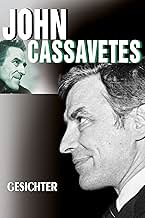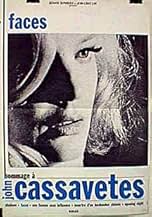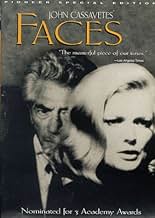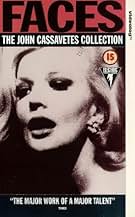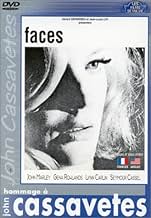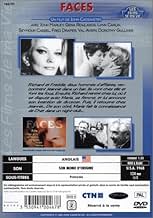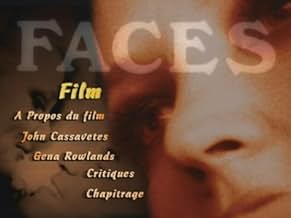Faces
- 1968
- Tous publics
- 2h 10min
NOTE IMDb
7,4/10
12 k
MA NOTE
Un homme d'âge mûr quitte sa femme pour une femme plus jeune. Peu de temps après, son ex-femme entame aussi une relation avec un partenaire plus jeune. Le film suit leurs difficultés à s'aim... Tout lireUn homme d'âge mûr quitte sa femme pour une femme plus jeune. Peu de temps après, son ex-femme entame aussi une relation avec un partenaire plus jeune. Le film suit leurs difficultés à s'aimer.Un homme d'âge mûr quitte sa femme pour une femme plus jeune. Peu de temps après, son ex-femme entame aussi une relation avec un partenaire plus jeune. Le film suit leurs difficultés à s'aimer.
- Réalisation
- Scénario
- Casting principal
- Nommé pour 3 Oscars
- 5 victoires et 9 nominations au total
George Dunn
- Comedian
- (as George Dunne)
Avis à la une
I'm sorry. I can't quite say I LIKED this movie. But, if nothing else, I... appreciated it. NO ONE can accuse Cassavetes of being unoriginal in any aspect of the production. Every frame of the film is remarkably unconventional. And furthermore, the performances were so starkly real it makes the prospect that there even WAS a script seem impossible to me. Now, I don't know any back story about this movie, but I'm sure there had to have been some script involved somewhere. What I'm saying is that the way the actors played it, the lines seemed... unwriteable. It's as if we were watching a documentary, but one where we can be certain those involved didn't know they were being filmed.
Basically, except for the poor dubbing that makes literally MOST of the dialogue in the film incomprehensible, I can't say there's anything about any individual sequences in the film that I disliked. HOWEVER, what I did have a problem with is this: the vanguard style of filmmaking, the characters, the situations they are in, the dialogue (if you want to call it that): does it all really come together to SAY anything? I didn't come away with any kind of an interesting or coherent message from the film. Which is fine if the scenes flow nicely together, but they really don't. Each scene as an entity unto itself is wonderful, but their juxtaposition together gets especially tiresome. I mean, for roughly 80% of the film, ALL of the characters onscreen are inebriated. Now, this makes it extremely difficult to get to know the characters beyond their buffoonish drunken altar egoes. Maybe, that was the point. I don't know. What I do know is that Cassavetes stubbornly refuses to reveal to us anything that even approximately resembles, plot, forward motion, or even... any kind of... an event... a happening until the last twenty minutes of the film when some interesting stuff finally happens. And this definitely alienates most audiences. Do you want to know why this movie has such a high rating? Because the people that didn't like it left after twenty-forty minutes. I know in the theater that I saw it in (a student film organization that watches intellectually stimulating independent fare weekly with warm response), the crowd of twenty people had been reduced by the end of the film to me, the president of the club (who was reading), and one other guy (whom I have a suspicion, fell asleep during at least part of the film) in the theater. EVERYBODY else got frustrated. Draw your own conclusions.
Basically, except for the poor dubbing that makes literally MOST of the dialogue in the film incomprehensible, I can't say there's anything about any individual sequences in the film that I disliked. HOWEVER, what I did have a problem with is this: the vanguard style of filmmaking, the characters, the situations they are in, the dialogue (if you want to call it that): does it all really come together to SAY anything? I didn't come away with any kind of an interesting or coherent message from the film. Which is fine if the scenes flow nicely together, but they really don't. Each scene as an entity unto itself is wonderful, but their juxtaposition together gets especially tiresome. I mean, for roughly 80% of the film, ALL of the characters onscreen are inebriated. Now, this makes it extremely difficult to get to know the characters beyond their buffoonish drunken altar egoes. Maybe, that was the point. I don't know. What I do know is that Cassavetes stubbornly refuses to reveal to us anything that even approximately resembles, plot, forward motion, or even... any kind of... an event... a happening until the last twenty minutes of the film when some interesting stuff finally happens. And this definitely alienates most audiences. Do you want to know why this movie has such a high rating? Because the people that didn't like it left after twenty-forty minutes. I know in the theater that I saw it in (a student film organization that watches intellectually stimulating independent fare weekly with warm response), the crowd of twenty people had been reduced by the end of the film to me, the president of the club (who was reading), and one other guy (whom I have a suspicion, fell asleep during at least part of the film) in the theater. EVERYBODY else got frustrated. Draw your own conclusions.
This is obviously not your average, everyday movie. It's some thing you could only watch at an art-house theater, so clearly this movie is not for just everyone.
John Cassavetes was a sort of guerrilla film-maker. His movies never felt like it had any storyboards or were rehearsed in any way. There was never a pre-setup plan, concerning any of its camera-work or positions and the actors all also seemed to be ad-libbing at points. They were just simply shooting away, which gives the movie a very raw and authentic feeling. I think this is the foremost reason why people really like his movies. I myself can appreciate it but that doesn't mean I'm that fond or impressed with it as well.
No, it's not really an easy or pleasant movie to watch. It's because the story is not really following a clear main plot line and things just seem to happen very randomly. I just simply prefer a more clear and straightforward story, since it also seemed to me that because of Cassavetes' approach, some of the sequences seemed to go on for ever and often weren't making that much sense for the story either.
I can still understand the story and what Cassavetes was trying to do and tell with it. It's basically a look into married life and not about any of its peachy or happy aspects. But however, like I mentioned before, I would had been more taken by it and probably would had find the story to be a more interesting one, if it had a more straightforward story and approach to it.
But yet I never hated watching this movie either. I can still definitely appreciate the way it got made and also all of the actors were a joy to watch. The movie really has some fine actors in it and I was especially fond of John Marley's performance. It were however Lynn Carlin and Seymour Cassel who received an Oscar nomination for their roles in this move.
Actually it seems quite amazing to me how this movie managed to score 3 Oscar nominations, since it's such an artistic movie, that normally would hardly get ever noticed or recognized by any of the big award shows. It perhaps says something about the popularity or status of director and writer John Cassavetes at the time or how people looked at movies.
For most people this movie will probably be too tough to bite through, or it simply won't be interesting enough to sit through but there is still a large crowd for these sort of movies out there. So if it sounds like it's your thing, chances are you'll probably end up loving it.
7/10
http://bobafett1138.blogspot.com/
John Cassavetes was a sort of guerrilla film-maker. His movies never felt like it had any storyboards or were rehearsed in any way. There was never a pre-setup plan, concerning any of its camera-work or positions and the actors all also seemed to be ad-libbing at points. They were just simply shooting away, which gives the movie a very raw and authentic feeling. I think this is the foremost reason why people really like his movies. I myself can appreciate it but that doesn't mean I'm that fond or impressed with it as well.
No, it's not really an easy or pleasant movie to watch. It's because the story is not really following a clear main plot line and things just seem to happen very randomly. I just simply prefer a more clear and straightforward story, since it also seemed to me that because of Cassavetes' approach, some of the sequences seemed to go on for ever and often weren't making that much sense for the story either.
I can still understand the story and what Cassavetes was trying to do and tell with it. It's basically a look into married life and not about any of its peachy or happy aspects. But however, like I mentioned before, I would had been more taken by it and probably would had find the story to be a more interesting one, if it had a more straightforward story and approach to it.
But yet I never hated watching this movie either. I can still definitely appreciate the way it got made and also all of the actors were a joy to watch. The movie really has some fine actors in it and I was especially fond of John Marley's performance. It were however Lynn Carlin and Seymour Cassel who received an Oscar nomination for their roles in this move.
Actually it seems quite amazing to me how this movie managed to score 3 Oscar nominations, since it's such an artistic movie, that normally would hardly get ever noticed or recognized by any of the big award shows. It perhaps says something about the popularity or status of director and writer John Cassavetes at the time or how people looked at movies.
For most people this movie will probably be too tough to bite through, or it simply won't be interesting enough to sit through but there is still a large crowd for these sort of movies out there. So if it sounds like it's your thing, chances are you'll probably end up loving it.
7/10
http://bobafett1138.blogspot.com/
When I began watching Faces, I realized that I never knew just when the present scene was going to end. I then realized that I wished that it would last forever. I found myself so engrossed in the scene that I was fascinated with it by itself. Then the next scene began, and the next scene, and within each one, there is a whole single movie with characters and a story arch. Faces is a film that does not allow any given scene to simply be a communication of plot information. Cassavetes created an entire universe for his actors in every scene. Each scene is a million years of passion spliced together, each demonstrating brazenly his brilliant recognition of human exchange and in conversation and conflict what is exchanged and what is left to be desired.
The film has moments of great pain because miniature struggles are so real and they tend to be vocalizations of a person's deeper fears in social interactions and in the structure of life. The film has scenes of furious drama because characters will experience blind unleashing of their ids as middle-aged people. Faces also delivers highly during moments of happiness and fun because, the situation's comfort level gracefully allowing, the characters will show the fieriest, grandiose, extroverted parts of themselves.
The movie's message, ironically, is not about the inner self and the unleashing of it but about the naiveté with which people carry out their normal married lives and don't care to face their flaws and problems and, though they gradually strip their personalities down bare throughout interactions, they continue not knowing themselves or each other. Faces is now among my favorite films of all time and places John Cassavetes on a pedestal as an idol of mine. The movie is a supreme demonstration of powerhouse acting, wherein each performance can be cherished by the performer with a feeling of ownership. There is a bit of real actor in each character played, and that can be seen in each and every powerhouse scene in a row.
The film has moments of great pain because miniature struggles are so real and they tend to be vocalizations of a person's deeper fears in social interactions and in the structure of life. The film has scenes of furious drama because characters will experience blind unleashing of their ids as middle-aged people. Faces also delivers highly during moments of happiness and fun because, the situation's comfort level gracefully allowing, the characters will show the fieriest, grandiose, extroverted parts of themselves.
The movie's message, ironically, is not about the inner self and the unleashing of it but about the naiveté with which people carry out their normal married lives and don't care to face their flaws and problems and, though they gradually strip their personalities down bare throughout interactions, they continue not knowing themselves or each other. Faces is now among my favorite films of all time and places John Cassavetes on a pedestal as an idol of mine. The movie is a supreme demonstration of powerhouse acting, wherein each performance can be cherished by the performer with a feeling of ownership. There is a bit of real actor in each character played, and that can be seen in each and every powerhouse scene in a row.
I have only recently become acquainted with Cassavetes films and I am continually impressed. This film was made on a shoestring budget filming primarily at night because the actors had day jobs. The working title, I understand, was "Dinosaurs" which sums up things up nicely. This is an important film since it shows flawed human beings especially in a time that was truly in upheaval - the late `60's. But Cassavetes was already anticipating the attempt at overthrowing the status-quo. This is a hard but fascinating film to watch. The masks, the self-loathing, the fear, the confusion of intimacy, the now tired slogan of the war between the sexes with entertainment all driven by prescription pills, alcohol and cigarettes...it's all here. Is it "real" or is it "contrived"? Even a well acted scripted play still can penetrate us. The people and conversation "inane"? You bet. Go to work or a club and listen closely -- we live lives that should never be filmed. Cassavetes films as if he's eavesdropping. Lastly - I could not imagine this film or 'Shadows' in anything but b/w....even if he COULD have afforded color stock. Excellent film.
So this is the work of John Cassavetes? Pretty good, I must say. I definitely can appreciate good conversations and witty dialogue any day.
This film, I would say is another one of those indie films (sort of foreign-filmmaking- esque) from how it is much ado about NOTHING. I love these films. They are like a breath of fresh air. That, and they always seem so personal. I wonder if it was actually scripted or if it was improvised like most Cassavetes projects.
The only work I have seen of Mr. John Cassavetes was his depute film, Shadows, which was mainly all improve, or so he says in his interviews. I take a strong liking to these films because of how slow they are, yet SO INVITING; so UN-American, if you will. - People have said that Cassavetes brought the indie film movement to the states. So far I have not been proved wrong so far. His films, such as Faces, are all so unique and timeless. Like literally, I believe this movie will be studied until THE END OF TIME.
I like seeing people celebrating. It is nice. Gives one the feeling of calmness; like nothing extreme is happening so we don't have to waste any time stressing about it. Does that make sense?
Our main protagonist, Richard Forst (played by John Marley), is a (so called) businessman who has an affair with a much younger woman. Little does he know that his wife has some plans of her own.. You can really tell what kind of man Robert is when he says:
"I'm just a mild success in a dull profession, and I want to start over again. And I've got a bad kidney!"
This just shows what kind of person he is as he says it to the younger girl, Jeannie (played by the beautiful Gene Rowlands).
I really like the acting and love the struggles and conflict that this husband and wife go through. Both are trying to find happiness in so many ways, but is only making it worse for themselves. .
-- Michael Mendez
This film, I would say is another one of those indie films (sort of foreign-filmmaking- esque) from how it is much ado about NOTHING. I love these films. They are like a breath of fresh air. That, and they always seem so personal. I wonder if it was actually scripted or if it was improvised like most Cassavetes projects.
The only work I have seen of Mr. John Cassavetes was his depute film, Shadows, which was mainly all improve, or so he says in his interviews. I take a strong liking to these films because of how slow they are, yet SO INVITING; so UN-American, if you will. - People have said that Cassavetes brought the indie film movement to the states. So far I have not been proved wrong so far. His films, such as Faces, are all so unique and timeless. Like literally, I believe this movie will be studied until THE END OF TIME.
I like seeing people celebrating. It is nice. Gives one the feeling of calmness; like nothing extreme is happening so we don't have to waste any time stressing about it. Does that make sense?
Our main protagonist, Richard Forst (played by John Marley), is a (so called) businessman who has an affair with a much younger woman. Little does he know that his wife has some plans of her own.. You can really tell what kind of man Robert is when he says:
"I'm just a mild success in a dull profession, and I want to start over again. And I've got a bad kidney!"
This just shows what kind of person he is as he says it to the younger girl, Jeannie (played by the beautiful Gene Rowlands).
I really like the acting and love the struggles and conflict that this husband and wife go through. Both are trying to find happiness in so many ways, but is only making it worse for themselves. .
-- Michael Mendez
Le saviez-vous
- AnecdotesWhile filming a part on Bob Hope Presents the Chrysler Theatre (1963), John Cassavetes saw Steven Spielberg lurking around the set, as he was then in the habit of doing. Cassavetes approached Spielberg and asked what he wanted to be. When Spielberg replied he wanted to be a director, Cassavetes allowed the young man to direct him for the day. He later invited Spielberg to work on this film with Spielberg serving as an uncredited production assistant on Faces (1968) for two weeks.
- Citations
Maria Forst: There's a Bergman film in the neighborhood.
Richard Forst: I don't feel like getting depressed tonight.
- ConnexionsFeatured in Cinéastes de notre temps: John Cassavetes (1969)
- Bandes originalesLove Is All You Really Want
Written by Jack Ackerman
Meilleurs choix
Connectez-vous pour évaluer et suivre la liste de favoris afin de recevoir des recommandations personnalisées
- How long is Faces?Alimenté par Alexa
Détails
Box-office
- Budget
- 275 000 $US (estimé)
- Montant brut mondial
- 7 236 $US
- Durée2 heures 10 minutes
- Couleur
- Mixage
- Rapport de forme
- 1.66 : 1
Contribuer à cette page
Suggérer une modification ou ajouter du contenu manquant



